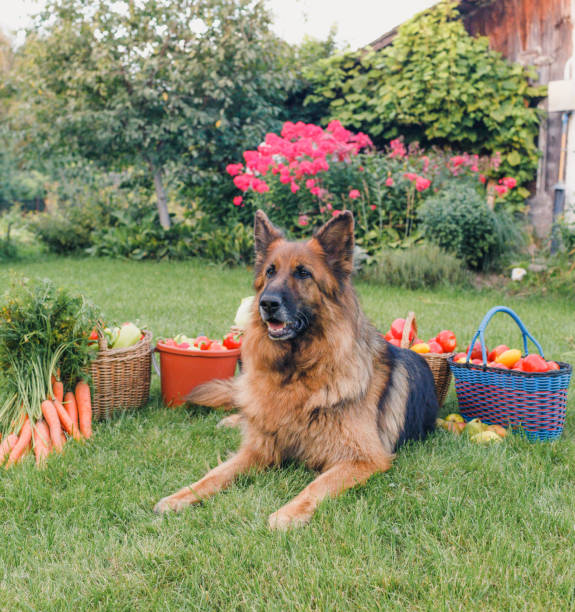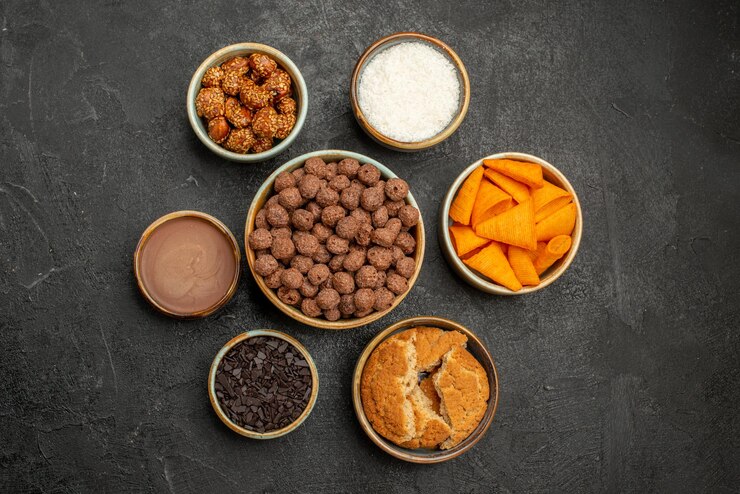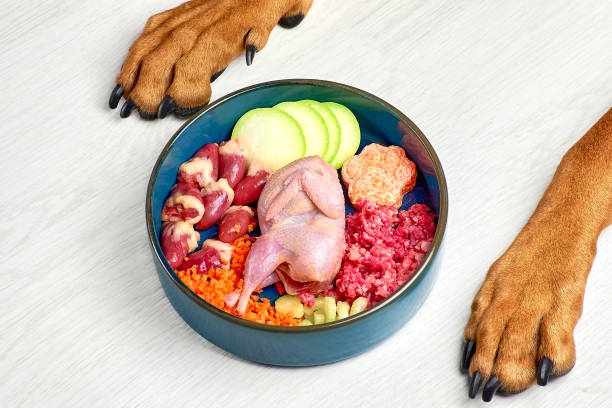Feeding your German Shepherd can feel like a puzzle sometimes. What’s safe? What’s
healthy? What should you avoid? Their loss of weight is essential for overall health and energy. A healthy dog is a happy dog!
What can German Shepherds eat? are active and strong. They need a diet that supports muscle development, energy, and overall well-being. A balanced diet is like fuel for their high-energy lifestyle. Without proper nutrition, they may suffer from health issues like joint problems or obesity.
What Can German Shepherds Eat Safely?
Selecting the right foods is essential. Here’s a full look at what’s secure and nutritious for your
German Shepherd.
1:High-Protein Dog Food Options
Proteins are the building blocks of your dog’s cutting fat. They deliver the amino acids needed
for muscle growth and repair. When selecting a dog food, look for options that list real meat as
the first component. Chicken, beef, lamb, and fish are great factors of protein. Avoid dog foods
that contain vague terms like “meat meal” or “animal by-products,” as these can be poor quality.
2:Fruits and Vegetables for German Shepherds Eat

Fruits and vegetables can be a huge adjunct to your dog’s weight. They provide important vitamins,
minerals, and fiber. Some great options include:
● Carrots: High in beta-carotene, good for view and immune health.
● Apples: Provide vitamin C and fiber, but remove the seeds.
● Blueberries: Rich in antioxidants, great for brain health.
● Bananas: In frugality, as they are high in sugar.
● Strawberries: Fresh, washed.
● Pineapple: Fresh. Without the skin or core.
● Spinach: High in iron and calcium, but feed in moderation.
Remember to wash all fruits and vegetables absolutely and cut them into manageable pieces to avoid choking.
3:Grains and Carbohydrates: Which Ones Are Best?
Not all grains are bad for dogs. Whole grains like brown rice, quinoa, and oats give ability and are simple on the digestive system. Carbohydrates from these grains help fuel your dog’s activities and keep them feeling full longer. Avoid graceful grains like white rice and wheat, as they offer little nutrient value and can take part in weight gain.
4:Safe Treats for Training and Rewards
Training a German Shepherd requires patience and the right impetus. Healthy treats can be a great motivator. Opt for a small part of cooked chicken, turkey, or low-calorie commercial dog treats. You can also use fruits like apple pieces or vegetables like baby carrots. Avoid treats with artificial colors, flavors, or excessive sugar.
Foods German Shepherds Should Avoid

There are some foods you should not feed your German Shepherd. Let’s explore them!
1:Toxic Foods to Keep Away
● Chocolate: comprise theophylline, which is harmful to dogs. Even small amounts can
cause vomiting, diarrhea, or even seizures.
● Caffeine: Found in coffee, tea, and energy drinks, caffeine can lead to rapid heart rate
and tremors.
● Alcohol: Even small amounts can lead to alcohol poisoning, causing vomiting,
disorientation, and even death.
● Grapes and Raisins: Can cause kidney failure, even in small quantities
2:Human Foods That Are Dangerous
● Onions and Garlic: These can damage your dog’s red blood cells, leading to anemia.
● Xylitol: A sugar substitute found in gum and some sweets. It can cause a dangerous
drop in blood sugar and liver spoilage.
● Macadamia Nuts: Can cause vomiting, increased body temperature, and weakness.
3 Understanding Food Allergies in German Shepherds
Some German Shepherds may have food allergies or intolerances. Common allergens include
beef, chicken, dairy, and grains. Signs of food allergies include:
● Itchy Skin: Often around the ears, paws, and stomach.
● Chronic Ear Infections: Persistent infections could indicate an allergic reaction.
● Gastrointestinal Issues: Diarrhea, vomiting, or gas.
If you notice these symptoms, consult your vet. An elimination diet can help recognize the
offending ingredient.
What Do German Shepherds Eat in the Wild?
Ever wondered what German Shepherds would eat if left to their own devices? Their wild
cousins, wolves, provide some insight.
1:Natural Diet and Hunting Habits
In the wild, these dogs are primarily carnivorous. They hunt small to medium-sized animals like
rabbits, birds, and even deer. Their diet would include meat, organs, and bones, providing a
well-balanced protein intake, heavy, and calcium.
2:Differences Between Wild and Domestic Diets
Unlike their wild cousins, German Shepherds advantage of a more varied diet including fruits, vegetables, and specially formulated dog food. While they still need a
high-protein diet, domestic dogs also require additional nutrients that may not be present in a
raw, wild diet.
Picking the perfect dog food can be overwhelming, with many choices possible. That’s an issue to help you make the best option
1:Importance of High-Protein Dog Food

High-protein dog food supports muscle growth and popular health. Aim for dog food with at least 22-26% protein content. Look for options with multiple protein sources, such as chicken and fish, to ensure a balanced amino acid profile.
2 How to Read Dog Food Labels
Dog food labels can be confusing. The first feature should always be a named protein cause
like “chicken” or “beef.” stop foods with vague situations like “meat meal” or “animal by-product.
Check for added nutrients and minerals, and avoid artificial protectors like BHA and BHT.
3:Recommended Brands and Options
Some recommended brands include:
● Blue Buffalo: Known for high-feature ingredients and no artificial preservatives.
● Royal Canin: Offers breed-specific formulas tailored to German Shepherds.
● Hill’s Science Diet: Great for dogs with specific health concerns like delicate stomachs
or joint health.
Always talk about this with your vet before making converts to your dog’s diet, especially if your dog has unique health concerns.
Tips for Feeding Your German Shepherd
Feeding your dog exactly includes more than just choosing the right food. It’s also about how
and when you feed them.
1:Setting a Feeding Schedule
Establish a lasting eating plan to advocate healthy digestion and avoid overeating. For most increased German Shepherds, feeding twice daily—once in the morning and once in the
evening—is ideal. Puppies may need more common meals.
2:Portion Control and Monitoring Weight
Obesity is a normal issue in German Shepherds. To avoid it, quantity your dog’s food
portions based on weight, age, and activity level. Regularly check their weight and adjust
parts as needed. Use a body situation score chart to establish if your dog is underweight,
overweight, or just right.
3:Introducing New Foods Safely
When introducing new foods, do so gradually. Mix a small image of the new food with your
dog’s present food, gradually increasing the amount over 7-10 days. This helps avoid stomachic
disturbance and allows you to observe for adverse reactions.
FAQs
What Can German Shepherds eat raw meat?
Yes, raw meat can be part of a balanced diet. However, secure it’s fresh and properly sourced
to avoid bacterial contamination. Counsel your vet before starting a raw diet.
What fruits are safe for German Shepherds?
Safe fruits involve apples (without seeds), bananas, blueberries, and watermelon. Always serve
In mitigation, avoid fruits like grapes and raisins.
How much food should I provide my German Shepherd each day?
The amount depends on your dog’s age, weight, and activity level. Usually, an adult German
Shepherd requires 2-3 cups of best food twice a day.
Are grains necessary in their diet?
Grains are not essential but can provide valuable nutrients and energy. If your dog is not
allergic, whole grains like brown rice and oatmeal are good options. If they have a sensitivity, opt
for grain-free formulas.
What actions should I take if my dog develops a food allergy?
If you suspect your dog has a food allergy, contact your vet for advice. They might suggest an
elimination diet to pinpoint the allergen. Once identified, avoid foods containing that ingredient
and move to a hypoallergenic diet if essential.
Conclusion
Feeding your German Shepherd a balanced weight is essential for their health, energy, and longevity.
Focus on high-feature proteins, healthy fats, and a balanced mix of vitamins and minerals.
Always be mindful of foods to avoid and monitor for any signs of allergies. Keep in mind, that a
nutritious weight results in a joyful dog.

